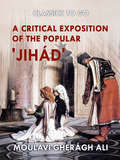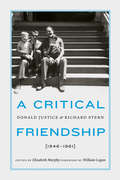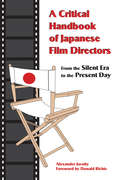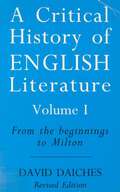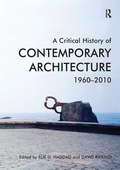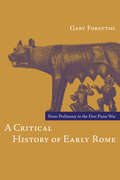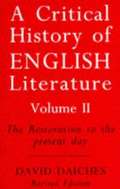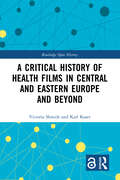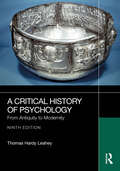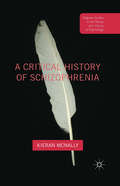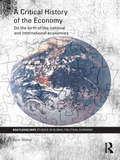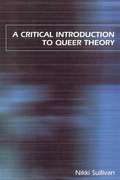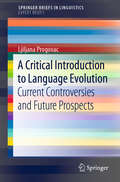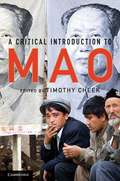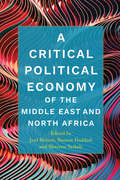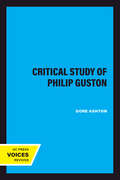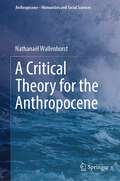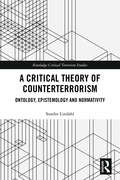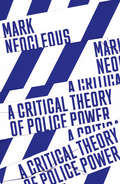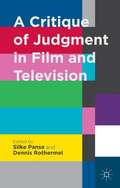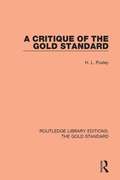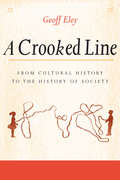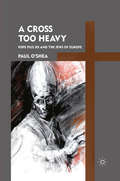- Table View
- List View
A Critical Exposition of the Popular 'Jihád' (The World At War)
by Cherágh AliA Critical Exposition of the Popular 'Jihád' Showing that all the Wars of Mohammad Were Defensive; and that Aggressive War, or Compulsory Conversion, is not Allowed in The Koran - 1885
A Critical Friendship: Donald Justice and Richard Stern, 1946-1961
by Donald Justice, Richard SternA chance meeting in the University of North Carolina campus library in 1944 began a decades-long friendship and sixty-year correspondence. Donald Justice (1925–2004) and Richard Stern (1928–2013) would go on to become, respectively, the Pulitzer Prize–winning poet and the acclaimed novelist. A Critical Friendship showcases a selection of their letters and postcards from the first fifteen years of their correspondence, representing the formative period in both writers&’ careers. It includes some of Justice&’s unpublished poetry and early drafts of later published poems as well as some early, never-before-published poetry by Stern.A Critical Friendship is the story of two writers inventing themselves, beginning with the earliest extant letters and ending with those just following their first major publications, Justice&’s poetry collection The Summer Anniversaries and Stern&’s novel Golk. These letters highlight their willingness to give and take criticism and document the birth of two distinct and important American literary lives. The letters similarly document the influence of teachers, friends, and contemporaries, including Saul Bellow, John Berryman, Edgar Bowers, Robert Lowell, Norman Mailer, Allen Tate, Peter Hillsman Taylor, Robert Penn Warren, Eudora Welty, and Yvor Winters, all of whom feature in the pair's conversations. In a broader context, their correspondence sheds light on the development of the mid-twentieth-century American literary scene.
A Critical Handbook of Japanese Film Directors
by Donald Richie Alexander JacobyThis important work fills the need for a reasonably priced yet comprehensive volume on major directors in the history of Japanese film. With clear insight and without academic jargon, Jacoby examines the works of over 150 filmmakers to uncover what makes their films worth watching.Included are artistic profiles of everyone from Yutaka Abe to Isao Yukisada, including masters like Kinji Fukasaku, Juzo Itami, Akira Kurosawa, Takashi Miike, Kenji Mizoguchi, Yasujiro Ozu, and Yoji Yamada. Each entry includes a critical summary and filmography, making this book an essential reference and guide.UK-based Alexander Jacoby is a writer and researcher on Japanese film.
A Critical History Of English Literature: From The Beginnings To Milton - Volume-1
by David Daiches"A Critical History of English Literature: The Restoration to the Present Day Volume-I" by David Daiches provides a comprehensive examination of English literature from the Restoration period onwards. Beginning with the tumultuous historical events that characterized the Restoration era, Daiches navigates through the subsequent literary epochs with scholarly precision. The book explores the emergence of various literary genres, the evolution of critical thought, and the contributions of key figures in shaping the literary landscape. Daiches's critical insights illuminate the connections between literature and the broader cultural, social, and political contexts of each period. This volume serves as an essential resource for readers seeking a thorough understanding of the foundational developments in English literature, making it a valuable companion for students, scholars, and enthusiasts interested in the multifaceted journey of English literary history.
A Critical History and Philosophy of Psychology
by Richard T. G. Walsh Thomas Teo Angelina Baydala Richard T. G. Walsh Thomas TeoIn line with the British Psychological Society's recent recommendations for teaching the history of psychology, this comprehensive undergraduate textbook emphasizes the philosophical, cultural and social elements that influenced psychology's development. The authors demonstrate that psychology is both a human (i. e. psychoanalytic or phenomenological) and natural (i. e. cognitive) science, exploring broad social-historical and philosophical themes such as the role of diverse cultures and women in psychology, and the complex relationship between objectivity and subjectivity in the development of psychological knowledge. The result is a fresh and balanced perspective on what has traditionally been viewed as the collected achievements of a few 'great men'. With a variety of learning features, including case studies, study questions, thought experiments and a glossary, this new textbook encourages students to critically engage with chapter material and analyze themes and topics within a social, historical and philosophical framework.
A Critical History of Contemporary Architecture: 1960-2010
by Elie G. Haddad David Rifkind1960, following as it did the last CIAM meeting, signalled a turning point for the Modern Movement. From then on, architecture was influenced by seminal texts by Aldo Rossi and Robert Venturi, and gave rise to the first revisionary movement following Modernism. Bringing together leading experts in the field, this book provides a comprehensive, critical overview of the developments in architecture from 1960 to 2010. It consists of two parts: the first section providing a presentation of major movements in architecture after 1960, and the second, a geographic survey that covers a wide range of territories around the world. This book not only reflects the different perspectives of its various authors, but also charts a middle course between the 'aesthetic' histories that examine architecture solely in terms of its formal aspects, and the more 'ideological' histories that subject it to a critique that often skirts the discussion of its formal aspects.
A Critical History of Early Rome: From Prehistory to the First Punic War
by Gary ForsytheDuring the period from Rome's Stone Age beginnings on the Tiber River to its conquest of the Italian peninsula in 264 B.C., the Romans in large measure developed the social, political, and military structure that would be the foundation of their spectacular imperial success. In this comprehensive and clearly written account, Gary Forsythe draws extensively from historical, archaeological, linguistic, epigraphic, religious, and legal evidence as he traces Rome's early development within a multicultural environment of Latins, Sabines, Etruscans, Greeks, and Phoenicians. His study charts the development of the classical republican institutions that would eventually enable Rome to create its vast empire, and provides fascinating discussions of topics including Roman prehistory, religion, and language. In addition to its value as an authoritative synthesis of current research, A Critical History of Early Rome offers a revisionist interpretation of Rome's early history through its innovative use of ancient sources. The history of this period is notoriously difficult to uncover because there are no extant written records, and because the later historiography that affords the only narrative accounts of Rome's early days is shaped by the issues, conflicts, and ways of thinking of its own time. This book provides a groundbreaking examination of those surviving ancient sources in light of their underlying biases, thereby reconstructing early Roman history upon a more solid evidentiary foundation.
A Critical History of English Literature: The Restoration to the present day - Volume-2
by David Daiches"A Critical History of English Literature: The Restoration to the Present Day Volume-II" by David Daiches offers a comprehensive exploration of English literature from the Restoration period to the contemporary era. Daiches critically analyzes the evolution of literary trends, genres, and individual works during this expansive time frame. The book delves into the societal, cultural, and political contexts that influenced literary production, providing readers with a nuanced understanding of the dynamic relationship between literature and the changing landscapes of British history. Daiches skillfully navigates through major movements, key authors, and seminal works, offering insightful interpretations and evaluations. The volume serves as an invaluable resource for students, scholars, and enthusiasts seeking a deeper appreciation and critical assessment of English literature from the Restoration period to the present day.
A Critical History of Health Films in Central and Eastern Europe and Beyond (Routledge Open History)
by Victoria Shmidt Karl KaserThe burgeoning scholarship on Western health films stands in stark contrast to the vacuum in the historical conceptualization of Eastern European films. This book develops a nonlinear historical model that revises their unique role in the inception of national cinematography and establishing supranational health security. Readers witness the revelation of an unknown history concerning how the health films produced in Eastern European countries not only adopted Western patterns of propaganda but actively participated in its formation, especially with regard to those considered “others”: Women and the populations of the periphery. The authors elaborate on the long “echo” of the discursive practices introduced by health films within public health propaganda, as well as the attempts to negate and deconstruct such practices by rebellious filmmakers. A wide range of methods, including the analysis of the sociological biographies of filmmakers, the historical reconstruction of public campaigns against diseases and an investigation into the production of health films, contextualizes these films along a multifaceted continuum stretching between the adaptation of global patterns and the cultivation of national authenticities. The book is aimed at those who study the history of film, the history of public health, Central and Eastern European countries and global history.
A Critical History of Psychology: From Antiquity to Modernity
by Thomas Hardy LeaheyThis fully updated and refreshed 9th edition places social, economic and political forces of change alongside psychology’s internal theoretical and empirical arguments. It utilizes a critical lens to illuminate the way in which the external world has shaped the development of psychology and, in turn, how psychology from antiquity to modernity has shaped society.The text approaches the material from an integrative, rather than wholly linear, perspective, carefully examining how issues in psychology reflect and affect concepts that lie outside the field of psychology’s technical concerns as a science and profession.Key features of this edition include: A newly reconsidered structure, including five additional interludes exploring historical background narratives and the rise of modernity, to allow for flexible and adaptable textbook use. Expanded exploration of the two psychologies: the Way of Ideas, driven by epistemology and unique to Europe, and The Way of Human Nature, a universal concern to find a science of human behavior and its management. Including scientific, applied, and professional psychology, as well as coverage of the social sciences and social policy implications, this book is appropriate for high-level undergraduate and graduate students.
A Critical History of Schizophrenia (Palgrave Studies in the Theory and History of Psychology)
by Kieran McNallySchizophrenia was 20th century psychiatry's arch concept of madness. Yet for most of that century it was both problematic and contentious. This history explores schizophrenia's historic instability via themes such as symptoms, definition, classification and anti-psychiatry. In doing so, it opens up new ways of understanding 20th century madness.
A Critical History of the Economy: On the birth of the national and international economies (RIPE Series in Global Political Economy)
by Ryan WalterDrawing on recent debates in critical International Political Economy, this book mobilizes the idea that the economy does not exist separately from society and politics to develop a detailed intellectual history of how the economy came to be seen as an independent domain. In contrast to typical approaches to writing the history of economic thought, which assume the reality of the economy, the author describes the forms of intellectual argument that made it possible to conceive of the national and international economies as objects of intellectual inquiry. At the centre of this process was the analytical separation of power and wealth. Walter thus offers a broad historical perspective on the emergence of current IPE theory, while linking the field with contextualist intellectual history. This important and innovative volume will be of strong interest to students and scholars of International Political Economy, International Relations, Economics, History and Political Theory.
A Critical Introduction To Queer Theory
by Nikki SullivanA Critical Introduction to Queer Theory explores the ways in which sexuality, subjectivity and sociality have been discursively produced in various historical and cultural contexts. The book begins by putting gay and lesbian sexuality and politics in historical context and demonstrates how and why queer theory emerged in the West in the late twentieth century. Sullivan goes on to provide a detailed overview of the complex ways in which queer theory has been employed, covering a diversity of key topics including: race, sadomasochism, straight sex, fetishism, community, popular culture, transgender, and performativity. Each chapter focuses on a distinct issue or topic, provides a critical analysis of the specific ways in which it has been responded to by critics (including Freud, Foucault, Derrida, Judith Butler, Jean-Luc Nancy, Adrienne Rich and Laura Mulvey), introduces key terms, and uses contemporary cinematic texts as examples.
A Critical Introduction to Khomeini
by Arshin Adib-MoghaddamAs the architect of the Iranian Revolution of 1979, Ayatollah Khomeini remains one of the most inspirational and enigmatic figures of the twentieth century. The revolution placed Iran at the forefront of Middle East politics and of the Islamic revival. Twenty years after his death, Khomeini is revered as a spiritual and political figurehead in Iran and in large swathes of the Islamic world, while in the West he is remembered by many as a dictator and as the instigator of Islamist confrontation. Arshin Adib-Moghaddam brings together both distinguished and emerging scholars in this comprehensive volume, which covers all aspects of Khomeini's life and critically examines Khomeini the politician, the philosopher, and the spiritual leader. The book details Khomeini's early years in exile from Iran, the revolution itself, and events that took place thereafter including the hostage crisis and the Iran-Iraq war. Lastly, the book considers his legacy in Iran where Khomeini's image has been used by both reformist and conservative politicians to develop their own agendas and further afield in other parts of the Islamic world and in the West. Written by scholars from varying disciplinary backgrounds, the book will prove invaluable to students and general readers interested in the life and times of Khomeini and the politics of Islam that he inspired.
A Critical Introduction to Language Evolution: Current Controversies And Future Prospects (Springerbriefs In Linguistics Ser.)
by Ljiljana ProgovacThis book provides a critical introduction to the current views and controversies regarding language evolution. It sheds new light on hot topics such as: How ancient is language? Did Neanderthals have some form of language? Did language evolve gradually and incrementally, through stages, or suddenly, in one leap, in all its complexity? Does language evolution involve natural selection or not? This book is essential reading for scholars and students interested in language evolution, especially those in the fields of linguistics, psychology, biology, anthropology, and neuroscience.
A Critical Introduction to Mao
by Timothy CheekMao Zedong's political career spanned more than half a century. The ideas he championed transformed one of the largest nations on earth and inspired revolutionary movements across the world. Even today Mao lives on in China, where he is regarded by many as a near-mythical figure, and in the West, where a burgeoning literature continues to debate his memory. In this book, leading scholars from different generations and around the world offer a critical evaluation of the life and legacy of China's most famous - some would say infamous - son. The book brings the scholarship on Mao up to date, and its alternative perspectives equip readers to assess for themselves the nature of this mercurial figure and his significance in modern Chinese history.
A Critical Political Economy of the Middle East and North Africa (Stanford Studies in Middle Eastern and Islamic Societies and Cultures)
by Joel Beinin, Bassam Haddad, and Sherene SeikalyThis book offers the first critical engagement with the political economy of the Middle East and North Africa. Challenging conventional wisdom on the origins and contemporary dynamics of capitalism in the region, these cutting-edge essays demonstrate how critical political economy can illuminate both historical and contemporary dynamics of the region and contribute to wider political economy debates from the vantage point of the Middle East. Leading scholars, representing several disciplines, contribute both thematic and country-specific analyses. Their writings critically examine major issues in political economy—notably, the mutual constitution of states, markets, and classes; the co-constitution of class, race, gender, and other forms of identity; varying modes of capital accumulation and the legal, political, and cultural forms of their regulation; relations among local, national, and global forms of capital, class, and culture; technopolitics; the role of war in the constitution of states and classes; and practices and cultures of domination and resistance. Visit politicaleconomyproject.org for additional media and learning resources.
A Critical Study of Philip Guston
by Dore AshtonThis title is part of UC Press's Voices Revived program, which commemorates University of California Press’s mission to seek out and cultivate the brightest minds and give them voice, reach, and impact. Drawing on a backlist dating to 1893, Voices Revived makes high-quality, peer-reviewed scholarship accessible once again using print-on-demand technology. This title was originally published in 1976.This title is part of UC Press's Voices Revived program, which commemorates University of California Press’s mission to seek out and cultivate the brightest minds and give them voice, reach, and impact. Drawing on a backlist dating to 1893, Voices Revived</DIV
A Critical Theory for the Anthropocene (Anthropocene – Humanities and Social Sciences)
by Nathanaël WallenhorstThis volume, which is rooted in biogeophysical studies, addresses conceptions of political action in the Anthropocene and the tension between a desire to accomplish the Promethean project of modernity and a post-Promethean approach. This work explores the idea of an anthropological mutation of political consolidation from a “post-Promethean togetherness”, to creating the capacity to act together. The political thinking of the human condition developed by Hannah Arendt is important here as a resource for thinking about humanity in terms of human adventure. This has three dimensions: hubris, the world and coexistence referring respectively to the logic of profit of the homo oeconomicus, the logic of responsibility of the homo collectivus and the logic of the hospitality of the homo religatus. The intellectual and political attitude outlined in this book is an extension of critical theory: the work also puts forward a critique of what poses a problem in our relationship to the world and suggests how to overcome it, the ultimate goal being social transformation. The author propose an uprising and an anthropological consolidation of politics based on the revitalization that is brought about by the sharing of a conviviality both between humans and with what is non-human. The identification of conviviality as an educational paradigm to survive the Anthropocene gives us the much needed reason for hope despite this heritage of the Anthropocene. In addition to Arendtian thinking, this critical theory for the Anthropocene draws on the political thinking of several contemporary authors including Maurice Bellet, Hartmut Rosa, Andreas Weber, Dominique Bourg, and Christian Arnsperger. This volume is of interest to researchers in the Anthropocene.
A Critical Theory of Counterterrorism: Ontology, Epistemology and Normativity (Routledge Critical Terrorism Studies)
by Sondre LindahlThis book offers a theory and model of counterterrorism based on emancipation and non-violence. Critical Terrorism Studies (CTS) scholars have produced wide-ranging and rich critiques of terrorism-related research, as well as state counterterrorism policies and practices. This work aims to fill in a gap in the current literature by constructing an original and specifically CTS model of counterterrorism. The model outlines the basic assumptions, priorities, principles, strategies and tactics, measures and evaluation of counterterrorism. It challenges prevalent models of counterterrorism through a radical rethinking of the ontology, epistemology and the agenda of counterterrorism. The model aims to prevent future acts of terrorism by (1) re-conceptualising how we study and understand terrorism, and; (2) suggesting that our efforts to counter and prevent terrorism must commensurate with the goals we want to achieve. Essentially, this involves a commitment to emancipation, and a rejection of violence as a tool. The second part of the book is a case study of Norwegian counterterrorism which shows how the theory and model developed in the book can be used. This is the first substantial analysis of Norwegian counterterrorism in almost ten years, and produces encouraging findings which support the potential for non-violent solutions to terrorism. This book will be of particular interest to students of terrorism and counterterrorism, critical security studies, and international relations in general.
A Critical Theory of Police Power: The Fabrication of the Social Order
by Mark NeocleousPutting police power into the centre of the picture of capitalismThe ubiquitous nature and political attraction of the concept of order has to be understood in conjunction with the idea of police. Since its first publication, this book has been one of the most powerful and wide-ranging critiques of the police power. Neocleous argues for an expanded concept of police, able to account for the range of institutions through which policing takes place. These institutions are concerned not just with the maintenance and reproduction of order, but with its very fabrication, especially the fabrication of a social order founded on wage labour. By situating the police power in relation to both capital and the state and at the heart of the politics of security, the book opens up into an understanding of the ways in which the state administers civil society and fabricates order through law and the ideology of crime. The discretionary violence of the police on the street is thereby connected to the wider administrative powers of the state, and the thud of the truncheon to the dull compulsion of economic relations.
A Critique of Judgment in Film and Television
by Silke Panse Dennis RothermelA Critique of Judgment in Film and Television is a response to a significant increase of judgment and judgmentalism in contemporary television, film, and social media by investigating the changing relations between the aesthetics and ethics of judgment.
A Critique of the Gold Standard (Routledge Library Editions: The Gold Standard #5)
by H. L. PuxleyOriginally published in 1933 this book discusses the inadequacy of ‘orthodox Gold Standard theory’ in the light of post-war monetary phenomena. In demonstrating that the Gold Standard had broken down the book explains that the Quantity Theory of Money is an inaccurate explanation of what happens over short periods and that the determining factor in the rise or fall of prices is the Velocity of Circulation. The book makes a plea for a workable Gold Standard operated by an international consortium of Central Banks.
A Crooked Line
by Geoff EleyEley (U. of Michigan), a self-described radical historian, looks back on his career as historian, while analyzing the great theoretical and methodological debates that roiled the field since the late 1960s and considering their contributions to and false paths for the field. Running through the narrative is an explicit awareness of the connection of these debates to politics outside the academy. Annotation ©2006 Book News, Inc. , Portland, OR (booknews. com)
A Cross Too Heavy: Pope Pius XII and the Jews of Europe
by Paul O'SheaThe papacy of Pius XII (1939-1958) has been a source of near-constant criticism and debate since his death, particularly because of his alleged silence during the Holocaust. Paul O'Shea examines his little-studied pre-papal life to demonstrate that Pius was neither an anti-Semitic villain nor a 'lamb without stain. '
